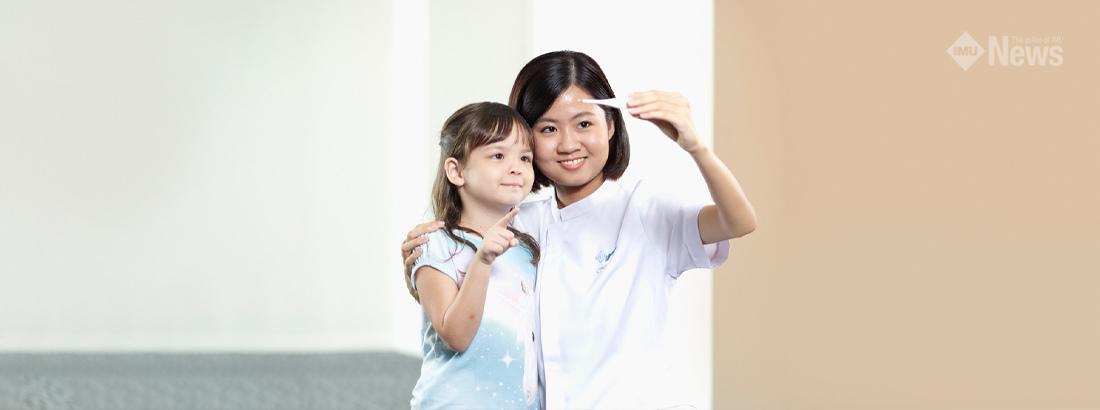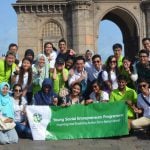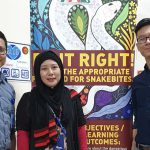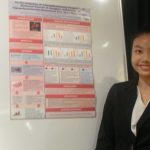Chen Yie Ling:
“Due to COVID-19 pandemic, our cohort’s clinical posting schedule was postponed until completion of Semester 4’s online lecture.”

“I had mixed feelings of worry and excitement before the start of this long-awaited clinical posting. During the clinical posting, we studied our patient’s illnesses, we learnt how to work as a team, and most importantly, we tried our best to apply theory into practice, other than planning, and caring for our patients. Overall, I think this clinical posting experience was very challenging yet enjoyable.”
“I would like to express my sincere gratitude to my Clinical Instructors who were very dedicated, shared their knowledge and supervised us to ensure that we gained our competencies. I am very much looking forward to the coming semesters and clinical postings in different fields.”
Mah Yi Ling:
“Being involved in clinical practice has been a wonderful learning experience for me to navigate the real concepts of nursing and its essence of care as a student nurse. This memorable real life hands-on clinical experience makes me even more eager to learn about what my educational experience has in store for me. It will be a stepping-stone for further progression of my educational learning with a more open-minded attitude to learn more in everyday practices.”

Lim Qi Hui:
“Throughout my clinical placement, I learnt and obtained more experiences and information. This has forced me to use every theory, knowledge, and skill that I had learned in the various class modules. Although clinical posting can be exhausting and demanding at times, I believe that it is highly beneficial not just because we can utilise what we have studied but also because we are able to experience nursing in real life, real situations, and genuine events.”

“Theoretically, we were taught with patients who presented with usual symptoms of a particular disease and condition. However, in a real-life clinical setting, we were confronted with various presentations of the same disease, added with many other complications that help with teaching us to expand our mindsets and knowledge. That taught me that we must not only act quickly, but also think quickly in order to deal with any emergency circumstances.”
“At first, before the clinical posting started, I was very afraid of working with staff nurses because I thought that they would ignore me and not help me. But after having a good relationship with them, I think most of the staff nurses and even some of the doctors are very friendly and enthusiastic. They are willing to teach and share current information and their experiences which made us understand the patient better and improve a lot in our care management!”
Yap Hooi San:
“Nursing is a constantly evolving profession. There are so many things you can do in the profession. It’s not just about providing care for a patient.”

“Empathy, paying attention to small details, communication and critical thinking are also part of the learning process. There are so much to learn from the clinical settings and a lot of information needed to be absorbed, on top of the assignments and practical examination that we need to complete. Therefore, during the journey, sometimes it can be very hard and stressful. Take a break, and it is okay to start again. Be determined and stay strong as the learning journey is definitely fruitful and worthy!”
Liew Jie Nee:
“Few months ago, I officially started my clinical posting at Hospital Tuanku Ja’afar Seremban which I have always been looking forward to. Throughout the months, I was exposed to cases with various diagnosis, drugs, laboratory tests and wounds. Not only that, I also encountered various kinds of patients in the hospital. Initially I was very worried that I would not be able to deal with patients who are scared of needles and if I would be able to establish a good rapport with patients. However, with repetitive practices and continuous encouragement from my Clinical Instructor, eventually as time goes by, I slowly gained more confidence and am able to overcome this issue independently.”

“Besides that, as this was our first involvement in the work field as part of the healthcare team, I realized that effective communication skill is extremely crucial to a nurse as we need to able to convey the patient’s needs or concerns other than providing health teaching to the patients. I still remember my first experience of teaching nasogastric tube feeding to a patient’s daughter. The whole session was tough, and it was challenging for me to communicate clearly in Malay. Nevertheless, the patient’s daughter was very kind and the patient allowed me to complete my teaching even though it took time as I explained it very slowly. Also, thanks to my clinical instructor who guided me and corrected me throughout my teaching session to ensure I delivered the right information to the patient’s family member”.
Ah Hui Gi:
“Feelings of excitement and fear came at the same time when we were told that students were finally allowed to go for clinical posting in the hospital after months of postponement. This time we were posted to Hospital Tuanku Ja’afar Seremban for four months and will be rotated through different departments according to the module being taught.”
“I was initially posted to the medical ward and was assigned to take care of patients which are mainly older adults and are highly dependent. With no experience in taking care of the elderly, I was initially reluctant to position or touch them because I fear that I was hurting them. However, I still need to assist them in their activities of daily living in a way that minimises their discomfort. In addition, I was grateful that they were willing to have me perform procedures and physical assessment on them. Every day is a new learning experience as I had faced different challenges that forced me to think more critically as well as learn new things that broaden my knowledge.”
“Personally, I think that taking on the initiative to learn and communicate with other healthcare providers is helpful in gaining a deeper insight into patients’ progress and the disease itself. Not only have I developed communication skills but also teamwork and time management skills.”
“Even though we are practicing under the supervision of clinical instructors, we were also given the chance to be independent in making decisions that could benefit our patients. Besides, the exposure to different clinical settings also allowed me to apply theoretical knowledge into practice.”

“The most interesting parts are sometimes we had the opportunity to assist and observe various medical procedures such as gastroscopy, colonoscopy, abdominal paracentesis, lumbar puncture, and chest tube insertion. Our responsibilities are to prepare the patients for the procedures and monitor them throughout as well as upon completion of the procedure to detect any complications. Moreover, there were also members from the wound team who taught us about wound assessment and management when they conducted the ward round.”
“Last but not least, we have our dedicated clinical instructors who guide and support us throughout the journey. They will always prioritize our learning experience and ensure that we are well equipped with the knowledge and skills to be a competent nurse in the future.”
Foo Wei Wen:
“As a nurse, we must always be observant and competent. Nurses must accurately identify, observe, and assess signs of normal or abnormal conditions when the patient is receiving care. Nurses must also display good personal commitment and behavior which can lead to gaining trust from patients as well as co-workers. Moreover, being able to build up a good rapport with the patient also helps to ensure holistic care is accurately delivered to the patients.”
“During this clinical posting, it was a great experience for me to learn and gain knowledge. The atmosphere in different wards brought out different challenging incidents. The working pace of the nurses was with competence and expertise. The response time for the nurses to act on the sudden occurrence was rapid. As a result, this had met the demand of the patients as the health services given to the patients are with quality and efficiency.”

“In short, it was a challenging experience in this clinical posting. I had learned to communicate with patients as well as build up a good rapport with co-workers. It was also important to apply bits of knowledge and skills that had been taught during the school days to perform holistic care to the patients. There is a need to act calmly in facing and evaluating the patient’s conditions and situations. Therefore, the insight gained during this experience will be used to deliver better healthcare throughout my clinical posting”.

Written by Bachelor of Nursing (Hons) Students from NU120 cohort.
Reviewed by Chow Suh Hing & Dr Lim Swee Geok.









